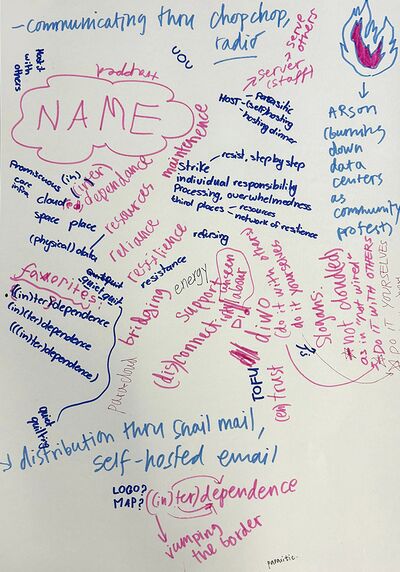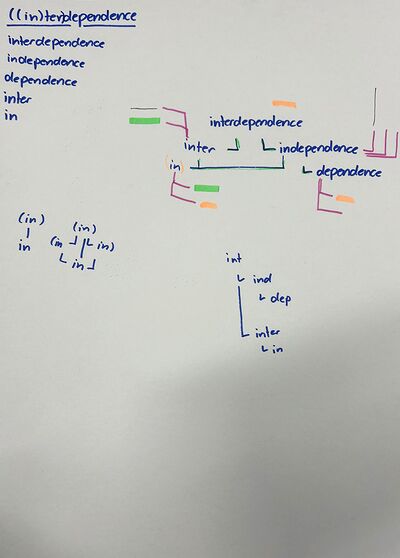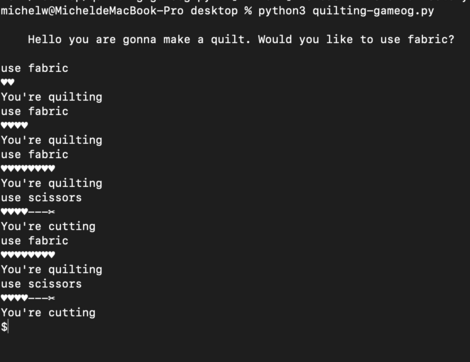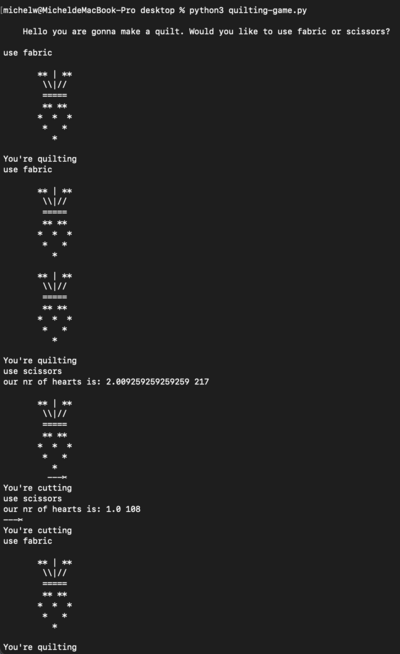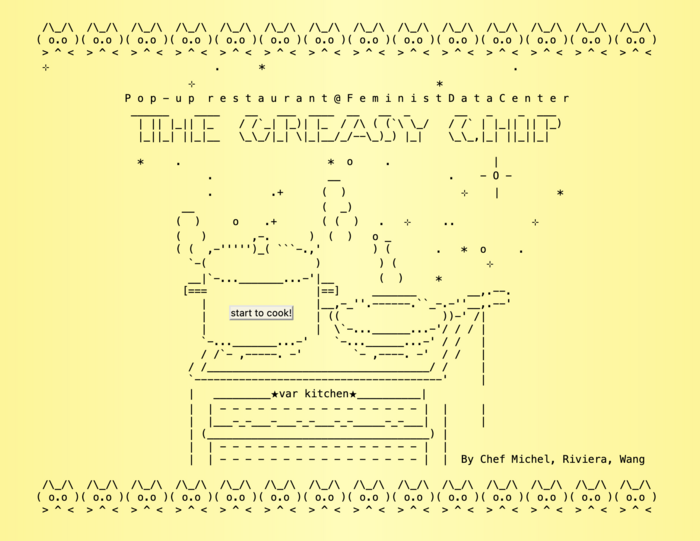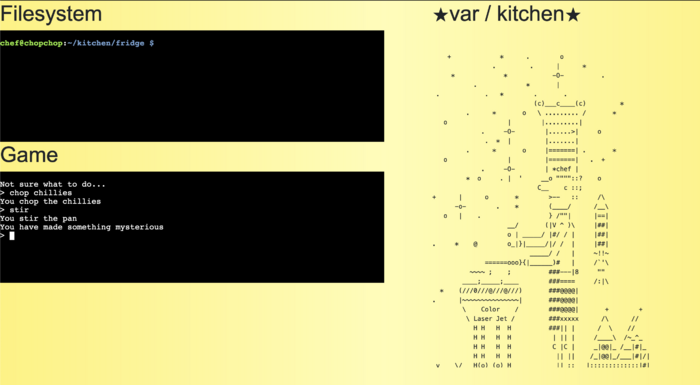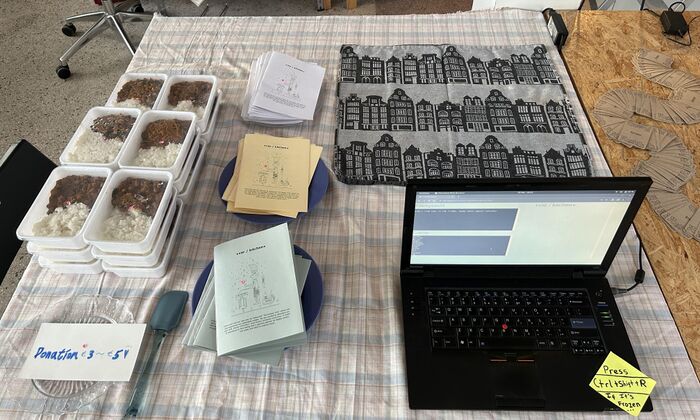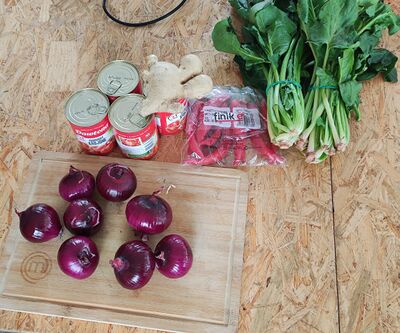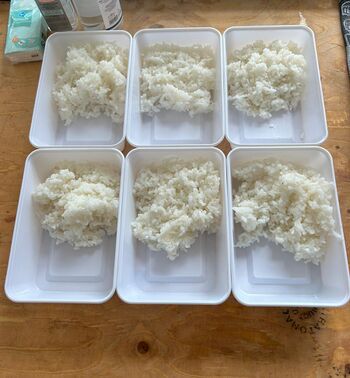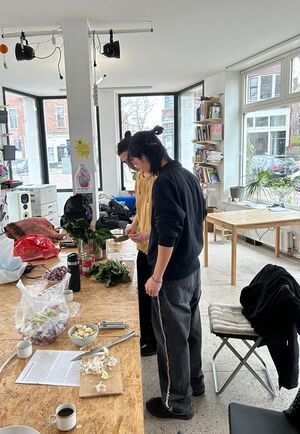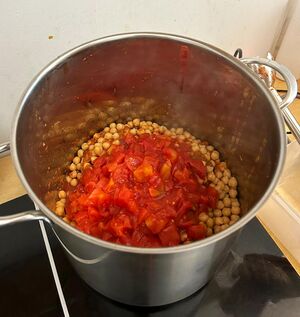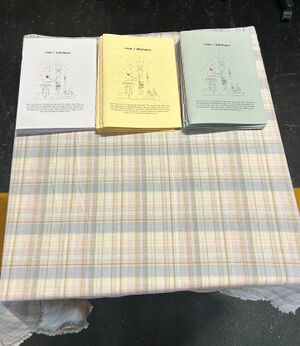User:Michel W/SPECIAL ISSUE🥀23: Difference between revisions
No edit summary Tag: Manual revert |
|||
| (83 intermediate revisions by the same user not shown) | |||
| Line 3: | Line 3: | ||
<div style=" font-family: Times New Roman; font-size: 16px; "> | <div style=" font-family: Times New Roman; font-size: 16px; "> | ||
== '''I.January | == '''I.January''' == | ||
=== Special Issue🕸️ === | === Special Issue🕸️ === | ||
A feature of technology would like to added is that '''''it could makes a therapeutic magic to oneself⭑~''''' | |||
* What is a server? | |||
A computer that runs a program to provide services, or rather a role that a computer takes by running this program. Other computers can connect to the servers, either in a local network or remotely. | |||
Servers can be dedicated to one service (database, website, email, ftp) or can provide all these services in one server. | |||
(HTTP: Hypertext Transfer Protocol is an application protocol that defines a language for clients and servers to speak to each other.) | |||
⊹[https://monoskop.org/images/a/a0/Art_Servers_Unlimited_1998.pdf Art Servers Unlimited] | |||
⊹[https://vvvvvvaria.org/etherpump/p/self-hosting-together.raw.html Self-hosting together] | |||
Feminist Server Summit: | |||
⊹Summary: https://areyoubeingserved.constantvzw.org/Summit.xhtml | |||
⊹PDF: https://areyoubeingserved.constantvzw.org/AreYouBeingServed.pdf | |||
* What is cloud computing? | |||
'Cloud computing is an increasingly commonplace term today, used to describe the relocation of hardware resources, programs, and data from individual, local machines to a network accessible from a variety of platforms and devices. [...] the removal of the need for the user to be near to the larger material forms of storage and processing' | |||
⭑A FEMINIST SERVER MANIFESTO 0.01⭑ | |||
'''A feminist server… ''' | |||
* Is a situated technology. She has a sense of context and considers herself to be part of an ecology of practices | |||
* Is run for and by a community that cares enough for her in order to make her exist | |||
* Builds on the materiality of software, hardware and the bodies gathered around it | |||
* Opens herself to expose processes, tools, sources, habits, patterns | |||
* Does not strive for seamlessness. Talk of transparency too often signals that something is being made invisible | |||
* Avoids efficiency, ease-of-use, scalability and immediacy because they can be traps | |||
* Knows that networking is actually an awkward, promiscuous and parasitic practice | |||
* Is autonomous in the sense that she decides for her own dependencies | |||
* Radically questions the conditions for serving and service; experiments with changing client-server relations where she can | |||
* Treats network technology as part of a social reality | |||
* Wants networks to be mutable and read-write accessible | |||
* Does not confuse safety with security | |||
* Takes the risk of exposing her insecurity | |||
* Tries hard not to apologize when she is sometimes not available | |||
[https://etherpad.mur.at/p/tfs '''Trans★feminist servers'''] | |||
=== Prototyping🕸️ === | === Prototyping🕸️ === | ||
How to serve over the internet? | |||
* HUB | |||
* Using Jupyter | |||
* Configuring SSH with a Proxy jump | |||
[https://git.xpub.nl/XPUB/SI23/src/branch/main/web/quilt ⭑Git quilt] | |||
[https://git.xpub.nl/XPUB/SI23 ⭑Git SI23] | |||
If your jupyter is stuck, you can restart it with this command: | |||
sudo service jupyterlab@USERNAME restart | |||
You can also check its status with: | |||
sudo service jupyterlab@USERNAME status | |||
[https://developer.mozilla.org/en-US/docs/Web/API Web API] | |||
[https://issue.xpub.nl/23/quilt/quilt.html Quilt database] | |||
$ git status | |||
To remove all the changes you made after your last pull/push | |||
$ git stash | |||
$ git commit -m "i fixed the ascii art" | |||
[[SSH_proxy_jump|⊹Proxy Jump]] | |||
[https://opensource.com/article/19/7/bash-aliases Bash Alias] | |||
=== Methods🕸️ === | === Methods🕸️ === | ||
==== | ====🕷️Wordquilt🕷️==== | ||
[[Wordquilt| | [[Wordquilt|⊹Word quilt⊹⊹⊹]] | ||
[https://hub.xpub.nl/bootleglibrary/shelf/101 Library shelf] | |||
⊹Editorial 2 Team: Senka, Alessia, Thijs, and me :3 | ⊹Editorial 2 Team: Senka, Alessia, Thijs, and me :3 | ||
Pad: https://pad.xpub.nl/p/editorial-team-2 | Pad: https://pad.xpub.nl/p/editorial-team-2 | ||
⊹Keyword wordquilt No.1: [[((in)ter)dependence|((in)ter)dependence]] | |||
[[File:Interdependence 1.jpg|400px|frameless]] | |||
[[File:Interdependence 2.jpg|400px|frameless]] | |||
Pad 01/31: https://pad.xpub.nl/p/si23-310124 | |||
== '''II.February''' == | |||
=== Special Issue🕸️ === | |||
''Why quilt?'' | |||
* to move from the abstract to the concrete - stitches, patches, seams, quilt | |||
* gives an opportunity to visualise the work done collectively | |||
* gives an opportunity to practice decision making protocols | |||
* can be a method of publishing and storytelling | |||
* a form of kinesthetic learning | |||
* gives everyone something to be engaged in while making collective decisions | |||
Highlight the historical connection beween weaving/textile work and computation - the jaquard loom, | |||
hand-woven software https://www.righto.com/2019/07/software-woven-into-wire-core-rope-and.html | |||
[https://www.vam.ac.uk/articles/an-introduction-to-quilting-and-patchwork ⊹An introduction to quilting and patchwork] | |||
[https://electronicbookreview.com/essay/retraced-threads-generating-feminist-textile-art-with-tracery/ ⊹Re:traced Threads: Generating Feminist Textile Art with Tracery] | |||
꧁꧂ | |||
I'm interested in the concepts of "quilting". For example, weaving, sewing, networking, combination of different projects/topics...etc. I like the ideas about creating a parallel between the patterns of quilting and codes/networks, also it's a good point to explore the seams, in both digital and physical ways. | |||
About my ideas of the game is that last Tuesday me and Senka made a quilting game, using Ascii art (or emojis) to create a digital quilt. We can also add quotes/information we found inspiring or want to share with public, so it became a quilt of both visual and textual info. | |||
Personally I'm fascinated with how to combine digital and physical methods to a project. It would be nice if we could print these digital quilt into paper/fabric etc in the end. | |||
(Not sure if possible but) I'm also thinking of the sounds quilting. Last Special Issue we have many recording/sounds archives, could it be a part of our "quilting"? Maybe we could bring several forms of quilting together into our final launch at Varia? :0 (Sounds like another way to active an archive)protocols for a quilting archive | |||
Quilting also reminds me of the craftivism and feminist methods. How to play games with feminist methods? | |||
https://en.wikipedia.org/wiki/Craftivism | |||
* Format: physical (objects, fabric etc) + digital (terminal game, webpage) | |||
꧁꧂ | |||
=== Prototyping🕸️ === | |||
====Python==== | |||
Python: high level general purpose programming language, that runs in the terminal | |||
* designed to make code easier to read and write (using significant indentation + no ; at the end of the line) | |||
* large built-in standard library of functionalities (> from time import sleep) | |||
* many libraries are available written by other people ($ pip3 install LIBRARY) | |||
* gives access to the whole operating system (network tools, file system, hardware, ...) | |||
[https://hub.xpub.nl/chopchop/~mb/SI23/python/text-adventures.html Text-adventure notebook] | |||
⭑To go through the following programming concepts: | |||
storing data in <code>variables</code> | |||
reading <code>input</code> from the user at the terminal | |||
organizing data in structures like <code>lists</code> and <code>dictionaries</code> | |||
using <code>if/else</code> statements to check different conditions | |||
encapsulating code with <code>functions</code> | |||
using <code>while</code> loops | |||
⭑To be able to play each others game from anywhere on chopchop... | |||
we can install it in a shared "bin" folder: | |||
- copy your game's python script to: /var/www/shared/bin/ | |||
$ cp mygame.py /var/www/shared/bin/ | |||
- remove the ".py" part from the filename, for example: xpub.py → xpub | |||
$ mv xpub.py xpub | |||
- add this to the first line of the script: | |||
#!/usr/bin/env python3 | |||
- run this command: | |||
$ sudo chmod +x /var/www/shared/bin/* | |||
Now try to run: | |||
$ xpub | |||
====❥Digital Quilting==== | |||
[[File:Quiltinggame og.png|470px|thumb|left|The original version, made with Senka]] | |||
[[File:Quiltinggame.png|400px|thumb|right|Ascii-art fired heart version, edited by me]] | |||
❥A terminal game, you weave a digital quilt with ASCII art characters and emojis. You can use fabric and scissors, fabric creates the patterns and that become a quilt, while scissors cut it in half. The digital quilting game was a first step in thinking how all of this different information, elements of texts that have had an influence on us, can start to unravel a narrative together. | |||
After a discussion with Senka, we decide to make a "digital quilting game" using python. I've always interested in how to combine physical and digital formats to an art projects so the idea is that when you finish a quilt in the terminal, you could print it out and get a physical outcome, a patchwork of quotes, decorations and cut outs. | |||
I've tried to use ascii art with a fireheart, but I found that I have difficulties with python scripts. Thijs was kindly helping me to deal with these scripts. I realized the white space of ascii art is the main problem for this python quilting game :( Although I'm happy we finally managed to do it. | |||
=== Methods🕸️ === | |||
[https://pad.xpub.nl/p/si23-070224 Code of Conduct] | |||
[https://pad.xpub.nl/p/((in)ter)dependence-code_of_conduct ((in)ter)dependence CoC Pad] | |||
== '''III.March''' == | |||
=== Special Issue🕸️ === | |||
==== The greasy chip==== | |||
[[File:Varkitchen-1.png|thumb|700px|center|The intro/start page of var/kitchen]] | |||
[[File:Varkitchen-2.png|thumb|700px|center|File system printing game + Cooking game (python)]] | |||
I | |||
'''[https://hub.xpub.nl/chopchop/~chef/kitchen/intropage.html ✨Start cooking here!✨]''' | |||
The var kitchen"The Greasy Chip," a pop-up restaurant where you can experience our delectable recipes. | |||
We strive to interrogate the terms of serving and service through acts of hospitality. | |||
Feel free to take a zine and started to explore the adventure! If you are starving, we have our speicial dish - chickpea curry. | |||
⭑Team Chef: Wang, Riviera, Michel | |||
⭑Pad: [https://pad.xpub.nl/p/Kitchen Var Kitchen] | |||
⭑Wiki: [https://pzwiki.wdka.nl/mediadesign/Var_kitchen The Greasy Chip] | |||
[[File:Varkitchen.jpg|700px|thumb|center|Our lovely table with delicious chickpea curry box]] | |||
[[File:Ingredients.jpg|400px|frameless|left]] | |||
[[File:Rice.jpg|frameless|upright=3.5|350px]] | |||
[[File:Chef1.jpg|300px|thumb|left|Chef Wang and Riviera at Varia]] | |||
[[File:Chickpan2.jpg|300px|frameless|upright=2]] | |||
[[File:Cooking zine.jpg|300px|thumb|center|Three colors of our cooking zine, designed and printed by me, 30 copies :)]] | |||
=== Prototyping🕸️ === | |||
[[Open_licenses_session|Open Licenses session]] | |||
꧁ How to print a booklet with Chopchop ꧂ | |||
1. Make a booklet, use <code>pdfimpose</code>: | |||
$ pdfimpose saddle ~/desktop/cookingzine/ouput.pdf | |||
2. Upload to Chopchop (can also use FileZilla or Jupyter) | |||
$ scp ouput-impose.pdfmszw@145.24.139.169:~/public_html/ouput-impose.pdf | |||
3. Use"lp"command to print <3 | |||
$ 1p -o sides=two-sided-short-edge -d hp-laserjet-p2055dn public_html/ouput.pdf | |||
=== Methods🕸️ === | |||
Latest revision as of 15:15, 8 April 2024

I.January
Special Issue🕸️
A feature of technology would like to added is that it could makes a therapeutic magic to oneself⭑~
- What is a server?
A computer that runs a program to provide services, or rather a role that a computer takes by running this program. Other computers can connect to the servers, either in a local network or remotely. Servers can be dedicated to one service (database, website, email, ftp) or can provide all these services in one server.
(HTTP: Hypertext Transfer Protocol is an application protocol that defines a language for clients and servers to speak to each other.)
Feminist Server Summit:
⊹Summary: https://areyoubeingserved.constantvzw.org/Summit.xhtml
⊹PDF: https://areyoubeingserved.constantvzw.org/AreYouBeingServed.pdf
- What is cloud computing?
'Cloud computing is an increasingly commonplace term today, used to describe the relocation of hardware resources, programs, and data from individual, local machines to a network accessible from a variety of platforms and devices. [...] the removal of the need for the user to be near to the larger material forms of storage and processing'
⭑A FEMINIST SERVER MANIFESTO 0.01⭑
A feminist server…
- Is a situated technology. She has a sense of context and considers herself to be part of an ecology of practices
- Is run for and by a community that cares enough for her in order to make her exist
- Builds on the materiality of software, hardware and the bodies gathered around it
- Opens herself to expose processes, tools, sources, habits, patterns
- Does not strive for seamlessness. Talk of transparency too often signals that something is being made invisible
- Avoids efficiency, ease-of-use, scalability and immediacy because they can be traps
- Knows that networking is actually an awkward, promiscuous and parasitic practice
- Is autonomous in the sense that she decides for her own dependencies
- Radically questions the conditions for serving and service; experiments with changing client-server relations where she can
- Treats network technology as part of a social reality
- Wants networks to be mutable and read-write accessible
- Does not confuse safety with security
- Takes the risk of exposing her insecurity
- Tries hard not to apologize when she is sometimes not available
Prototyping🕸️
How to serve over the internet?
- HUB
- Using Jupyter
- Configuring SSH with a Proxy jump
If your jupyter is stuck, you can restart it with this command:
sudo service jupyterlab@USERNAME restart
You can also check its status with:
sudo service jupyterlab@USERNAME status
$ git status
To remove all the changes you made after your last pull/push
$ git stash
$ git commit -m "i fixed the ascii art"
Methods🕸️
🕷️Wordquilt🕷️
⊹Editorial 2 Team: Senka, Alessia, Thijs, and me :3
Pad: https://pad.xpub.nl/p/editorial-team-2
⊹Keyword wordquilt No.1: ((in)ter)dependence
Pad 01/31: https://pad.xpub.nl/p/si23-310124
II.February
Special Issue🕸️
Why quilt?
- to move from the abstract to the concrete - stitches, patches, seams, quilt
- gives an opportunity to visualise the work done collectively
- gives an opportunity to practice decision making protocols
- can be a method of publishing and storytelling
- a form of kinesthetic learning
- gives everyone something to be engaged in while making collective decisions
Highlight the historical connection beween weaving/textile work and computation - the jaquard loom, hand-woven software https://www.righto.com/2019/07/software-woven-into-wire-core-rope-and.html
⊹An introduction to quilting and patchwork
⊹Re:traced Threads: Generating Feminist Textile Art with Tracery
꧁꧂
I'm interested in the concepts of "quilting". For example, weaving, sewing, networking, combination of different projects/topics...etc. I like the ideas about creating a parallel between the patterns of quilting and codes/networks, also it's a good point to explore the seams, in both digital and physical ways.
About my ideas of the game is that last Tuesday me and Senka made a quilting game, using Ascii art (or emojis) to create a digital quilt. We can also add quotes/information we found inspiring or want to share with public, so it became a quilt of both visual and textual info. Personally I'm fascinated with how to combine digital and physical methods to a project. It would be nice if we could print these digital quilt into paper/fabric etc in the end.
(Not sure if possible but) I'm also thinking of the sounds quilting. Last Special Issue we have many recording/sounds archives, could it be a part of our "quilting"? Maybe we could bring several forms of quilting together into our final launch at Varia? :0 (Sounds like another way to active an archive)protocols for a quilting archive
Quilting also reminds me of the craftivism and feminist methods. How to play games with feminist methods?
https://en.wikipedia.org/wiki/Craftivism
- Format: physical (objects, fabric etc) + digital (terminal game, webpage)
꧁꧂
Prototyping🕸️
Python
Python: high level general purpose programming language, that runs in the terminal
- designed to make code easier to read and write (using significant indentation + no ; at the end of the line)
- large built-in standard library of functionalities (> from time import sleep)
- many libraries are available written by other people ($ pip3 install LIBRARY)
- gives access to the whole operating system (network tools, file system, hardware, ...)
⭑To go through the following programming concepts:
storing data in variables
reading input from the user at the terminal
organizing data in structures like lists and dictionaries
using if/else statements to check different conditions
encapsulating code with functions
using while loops
⭑To be able to play each others game from anywhere on chopchop... we can install it in a shared "bin" folder:
- copy your game's python script to: /var/www/shared/bin/
$ cp mygame.py /var/www/shared/bin/
- remove the ".py" part from the filename, for example: xpub.py → xpub
$ mv xpub.py xpub
- add this to the first line of the script:
#!/usr/bin/env python3
- run this command:
$ sudo chmod +x /var/www/shared/bin/*
Now try to run:
$ xpub
❥Digital Quilting
❥A terminal game, you weave a digital quilt with ASCII art characters and emojis. You can use fabric and scissors, fabric creates the patterns and that become a quilt, while scissors cut it in half. The digital quilting game was a first step in thinking how all of this different information, elements of texts that have had an influence on us, can start to unravel a narrative together.
After a discussion with Senka, we decide to make a "digital quilting game" using python. I've always interested in how to combine physical and digital formats to an art projects so the idea is that when you finish a quilt in the terminal, you could print it out and get a physical outcome, a patchwork of quotes, decorations and cut outs.
I've tried to use ascii art with a fireheart, but I found that I have difficulties with python scripts. Thijs was kindly helping me to deal with these scripts. I realized the white space of ascii art is the main problem for this python quilting game :( Although I'm happy we finally managed to do it.
Methods🕸️
III.March
Special Issue🕸️
The greasy chip
The var kitchen"The Greasy Chip," a pop-up restaurant where you can experience our delectable recipes. We strive to interrogate the terms of serving and service through acts of hospitality. Feel free to take a zine and started to explore the adventure! If you are starving, we have our speicial dish - chickpea curry.
⭑Team Chef: Wang, Riviera, Michel
⭑Pad: Var Kitchen
⭑Wiki: The Greasy Chip
Prototyping🕸️
꧁ How to print a booklet with Chopchop ꧂
1. Make a booklet, use pdfimpose:
$ pdfimpose saddle ~/desktop/cookingzine/ouput.pdf
2. Upload to Chopchop (can also use FileZilla or Jupyter)
$ scp ouput-impose.pdfmszw@145.24.139.169:~/public_html/ouput-impose.pdf
3. Use"lp"command to print <3
$ 1p -o sides=two-sided-short-edge -d hp-laserjet-p2055dn public_html/ouput.pdf

